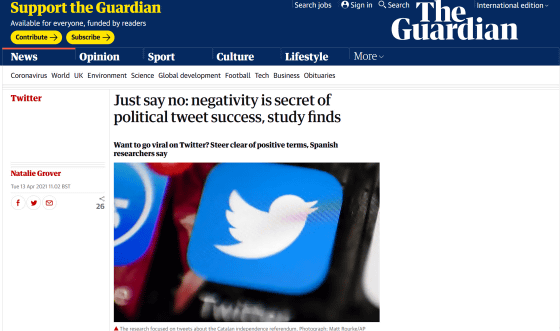Research results show that tweets with negative emotions are easy to buzz on Twitter

A huge number of tweets are posted on Twitter every day, but some of them go beyond follow-follower relationships and are shared and disseminated by a wide range of people who do not normally interact with them.
How do sentiments affect virality on Twitter? | Royal Society Open Science
https://royalsocietypublishing.org/doi/10.1098/rsos.201756
Negativity found to increase chances of Twitter posts going viral
https://phys.org/news/2021-04-negativity-chances-twitter-viral.html
Just say no: negativity is secret of political tweet success, study finds | Twitter | The Guardian
https://www.theguardian.com/technology/2021/apr/13/just-say-no-negativity-is-secret-of-political-tweet-success-study-finds

On Twitter and other social media sites, many people try to 'buzz' posts to get attention to a particular topic or to increase their social reputation. However, not all tweets posted with the intention of buzzing are not necessarily buzzed, and in some cases they are not spread as much as the user expected, and in other cases, unexpected tweets are spread.
In general, the factors that make tweets easy to buzz are related to 'the number of followers acquired so far', 'movies and images included in tweets, hashtags, links to external sites', 'topics mentioned by tweets', etc. It is said that it is. On the other hand, in the context of whether a particular post is buzzing, few studies have investigated whether 'emotions contained in tweets' are involved in buzzing.
So a research team at Jaen University decided to analyze tweets from the time of the 2017 Catalan Independence Referendum , when a serious political division occurred in Spain. Independence movements have been active in Catalonia for some time, and in October 2017, a referendum was held asking whether or not to become independent amid various obstacles by the central government.

by
The research team collected 46,962 tweets containing the hashtags '#CatalanReferendum' and '#ReferendumCatalan' posted on Twitter in the week of October 1, 2017, when the political division that shook Spain occurred. While controlling factors such as the number of followers and media usage, he used the Spanish emotional glossary to determine whether the emotions contained in the tweet were positive or negative.
Analysis revealed that negative emotions in tweets tend to reach a wider audience than positive ones. Tweets with positive terms reduced the number of RTs, while tweets with negative terms increased the number of RTs, the research team said.
The research team told The Guardian, a leading British newspaper, 'The conclusions drawn in the context of the survey show that negative tweets are more likely to spread than positive tweets, but this can vary by topic. There is. ' The research team suggests that negative tweets about the Catalan independence vote may have been buzzing, as many people in Spain were negative about the Catalan independence vote. Therefore, negative tweets are not always easy to buzz on all topics.

Related Posts:
in Mobile, Web Service, Posted by log1h_ik







